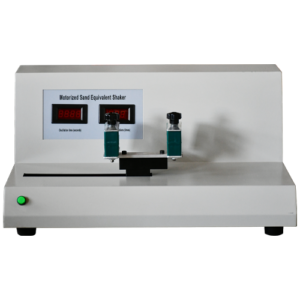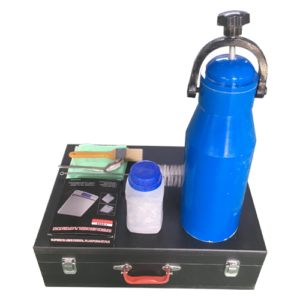
| Reading ruler | 1000mm |
|---|---|
| Penetration rod Upper pole | 803mm |
| Connecting disc | 105mm |
| Drop distance | 575mm |
| Penetration rod Down shot | 910mm |
| Bottom plate | 300mm*60mm*8mm |
| Drop hammer | 8KG |
| Cone head | ∅ 20mm,60° |
Introduction
The Dynamic Cone Penetrometer (DCP) is a light-weight touch probe for in-situ testing of foundation soil. It has a weight of 8KG, a drop distance of 575mm, a penetration rod length of 1000mm, a cone head diameter of 20mm, and a cone tip. It is 60 degrees, and the penetration rod can be connected with a 1000mm steel ruler. The metric and British double-sided readings can directly read the penetration value of each stroke.
The dynamic cone penetration instrument (DCP) has accumulated the relationship between the penetration value and the corresponding soil index in use abroad. The penetration value has been related to the elastic modulus of the soil, CBR, and unconfined compressive strength. The penetration value has been used as a parameter for pavement design in South Africa.
Advantage
The advantages of the Dynamic Cone Penetrometer (DCP) are fast, simple, and not limited by the site. It is suitable for the evaluation of the bearing capacity of the construction site or the old roadbed. The Dynamic Cone Penetrometer (DCP) can effectively overcome the shortcomings of sand irrigation, ring cutter, irrigation and electric borrower by quickly detecting the penetration of the soil foundation. It is a new generation of soil foundation compaction Fast performance testing equipment; at the same time, there is a good correlation between DCP and the California Bearing Ratio (CBR) and rebound modulus of the on-site subgrade, which can be used to evaluate the strength of the subgrade. (Converted according to AASHTO formula)
Analysis Method
Because the Dynamic Cone Penetrometer is rarely used in China, there is currently no relevant analysis method in China. According to the regulations of the American AASHTO, there is the following relationship between the DCP test results and CBR:
CBR=405.3/PR1.259
In the formula, PR is the penetration rate of the DCP test, mm/hammering times; CBR is the California load bearing ratio, %.
Therefore, by recording the penetration rate of DCP during the field test, the CBR of the soil foundation can be quickly calculated, and the bearing capacity of each layer of the roadbed can be preliminarily evaluated.
Test Principle
DCP was developed by the British Transportation Research Laboratory (Transportation, Research Laboratory, TRL for short), with a total weight of 20kg.
It mainly includes an 8kg drop weight with a drop height of 575mm, a penetration rod, a ruler, and a cone tip with a diameter of 20mm connected to the end of the penetration rod. Among them: the cone angle is 60 degrees.






We will contact you within 1 working day, please pay attention to the email with the suffix “@gtj-test.com”.